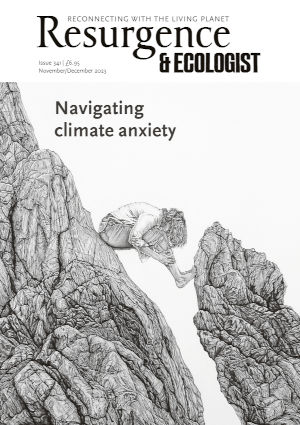What is the place of humans in the cosmos, and what are our obligations to the community of life on Earth? Environmental philosophers have long pointed to anthropocentrism, which portrays only humans as possessing mind, and Nature as mindless, as the deep source of environmental catastrophe. Freya Mathews opens her latest book with an appeal to President Xi Jinping to foster a Chinese civilisation drawing on the wisdom of its ancients. She follows with a critique of dualism and the “dissective”, atomising tendency of the west. In outlining her holistic and cosmic perspective, she asks how we can reinvent an ecological civilisation. The core of the book is her ecophilosophy of living cosmos panpsychism, rooted in the philosophy of Baruch Spinoza while owing much to the knowledge of Indigenous Australians and to Chinese Daoism.
Mathews argues that we need a radical approach to escape dualism. She doesn’t begin, as many do, by seeing the world as inanimate ‘stuff’ and then wondering where ‘mind’ might come from, but from the panpsychic position that some kind of innerness – mind, sentience, subjectivity – is a fundamental aspect of matter, just as matter is a fundamental aspect of mind. The cosmos is One, a coherent field of mind-matter, a meaning-making being with interest in its own self-existence. In its evolution and self-expression, the cosmos differentiates into Many – a multitude of self-realising and self-reflexive beings – all glorious yet temporary centres of meaning and action. These can be imagined as ripples or folds in the cosmic field, all of whom return in time to the cosmos from which they arose.
Viewed from the outside, the Many appear as the empirical particulars described by physics. Viewed from the inside, they constitute a texture of ever-unfolding subjective presence and experience. The One and the Many reach out to each other in mutual contact and communication, co-creating a “poetic ecology”, an order of meaning alongside the causal material. This expression of meaning does not emanate only from the human side: the world is capable of – actively seeks – engagement with us.
The assumptions we bring to our encounter with the world act as a kind of invocation. If our worldview invokes a mechanical world of brute matter, that is what we will experience. If we invoke a world of reciprocal presence, one that answers back when we reach out, then we may be blessed with what I call moments of grace. The subjectivity of the world is rendered responsive to humans, and we experience its sentient presence. This doesn’t take place in human language. It is necessarily poetic, conveying meaning not in words or concepts, but in image and metaphor, in a symbolic language of things. The world rearranges itself in response to our invocation: animals and birds appear, the breeze ruffles the trees, cloud formations change, all in ways that are synchronous with our invocation.
All this leads to a profoundly significant re-evaluation of ethics and morality. In the western worldview we only have ethical responsibility to other sentient beings – humans and, at a stretch, some ‘higher’ animals. In the vision of Mathews’ book, we should seek to align ourselves with this re-evaluation and act in accordance with it. There is, in other words, “an ‘ought’ at the core of the living cosmos of which we, as finite selves, need to be mindful” – not just intellectually, but in the way we live. That ought lies in the fundamental mutuality of the ecology as a whole that ensures the ongoing regeneration of life. Mathews refers to this as a “more ontologically reverent and cosmocentric way of inhabiting the world”.
The point is not simply to understand the world, but rather to encounter and rejoice in that experience. The challenge for a philosopher is not just to think about the world, but to offer perspectives that enable us to live here: “To know the world we need to walk the land,” to return, as Indigenous peoples teach us, to a mutual relationship with place.
This is a serious philosophy book, written with an elegant lucidity that makes it available to a general audience. A must-read for those who wish to ground their ecological work in a radical and coherent worldview.
The Dao of Civilization: A Letter to China by Freya Mathews. Anthem Press, 2023. ISBN: 9781839984853.







